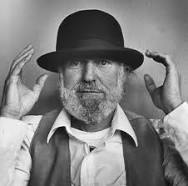
Stone Soup To City Lights: Jack Powers on Lawrence Ferlinghetti with Doug Holder
****I wanted to publish this old interview I conducted with the founder of the famed Stone Soup Poets–the late Jack Powers. Many of the younger poets on the scene today may not be familiar with this granddaddy of the Spoken Word movement here in Boston. Here he discusses his relationship with iconic Beat Poet and Publisher Lawrence Ferlinghetti.

Jack Powers
Jack Powers is the founder of Stone Soup Poets, a venue of readings and publishing in the Boston and Cambridge area for over thirty years. He has provided a space for open poetry readings from poets from all walks of life. He has also published poetry books for a variety of known and unknown poets, including: Lawrence Ferlinghetti, who was a major player in the Beat Poetry Movement on the West Coast in the 50’s. Jack recently visited Ferlinghetti in San Francisco where he still runs City Light Books. City Lights, the first all paperback bookstore, was founded by Ferlinghetti in 1953. Shortly after he formed a publishing house, creating his renowned Pocket Poet Series. Among the poets he published were: Allen Ginsberg, Gregory Corso, Jack Kerouac, Dianne DiPrima, to name just a few. I spoke with Powers about his recollections and his recent meeting with this legendary poet.
Doug Holder: Jack, you have told me more than once that Lawrence Ferlinghetti brought you back to poetry. What is it about the man that drew you to him?
Jack Powers: I think people of my generation were scared into a stasis in post-war America. I was turned on to Ferlinghetti when I read one of his books from the Pocket Poet Series Howl and other Poems by Allen Ginsberg. I came across it in a little bookstore at the corner of Mass. Ave and Huntington in Boston. In the late 50’s I went out to San Francisco with a dear friend and discovered Ferlinghetti’s City Lights Bookstore. I didn’t actually meet Ferlinghetti until 1975. I was attracted to Ferlinghetti’s poetry because it was written in the vernacular; he wrote about “high” things in the common tongue. Now in his 80’s, he is still a very formidable presence. I feel he will be recognized as a great poet in his own right, beyond his role as a guru of the Beat Movement.
Doug Holder: Ferlinghetti, along with Peter Martin, launched the first all-paperback bookstore in 1953, and later formed a publishing house, starting with their Pocket Poet Series in 1955. Was your own publishing house, Stone Soup Publishing, modeled after Ferlinghetti’s and Martin’s efforts?
Jack Powers: It was impossible not to be influenced by something so beautiful. When I went out to “Frisco”, and City Lights, I loved the feel of Grant St. ( home of City Lights), and the crazy people. When I say “crazy’ I mean the label that mainstream society gave them. Here were these creative people spreading their wings, amidst the stifling conformity of 1950’s America. The energy that came from that little bookstore in North Beach was inspiring. Ferlinghetti kept his “tire in track” simply put: he didn’t kill himself with booze and drugs, like so many others. Kerouac, for instance drank himself to distraction and died in his 40’s. Ginsberg bathed in the Ganges and was a master of histrionics. Ferlinghetti remained the solid core. Ferlinghetti was and is the model of the sober, committed artist. People could depend on him. He was the co-founder of the Beat Movement, but he was solidly planted like a tree. Every time I see Ferlinghetti I feel born again, flushed with new energy.

Lawrence Ferlinghetti
Doug Holder: Ferlinghetti published Ginsberg’s “Howl” You published Ferlinghetti’s “Jack of Hearts” Were there any similarities between the books?
Jack Powers: Ferlinghetti publishing “Howl” was a very natural development. He even wrote a poem “The Dog” in his book “Coney Island of the Mind”, that was based on the poetical persona of Ginsberg: The Dog trots freely in the street and sees reality and the things he sees are bigger than himself and the things he sees are his reality Drunks in doorways moons on trees I believe Ferlinghetti and Ginsberg belong together. Like two dogs they walked the street and wrote about the stark reality…the wino, the aging drag queen, the ethereal shine of the moon on a tree. They were both living question marks, searching for a common truth.
Doug Holder: During your trip to the Coast you told me that Ferlinghetti showed you the cottage that he let Kerouac use to dry out and concentrate on his writing. Describe the setting, the feeling, the sense of place or presence there.
Jack Powers: I remember touching the desk Kerouac did his writing on. I wondered how many words flowed from here. How incredibly privileged I was to be there. I followed a nearby creek to the Pacific. I stood in the ocean and said: “Thank you, I understand.” Just like the creek, we start out as a mere trickle and make that universal passage to the sea, the world at large, the cosmos, what have you. The shore puts you in contact with constant reality, like a heartbeat. After I got back to Boston, I had the most remarkable thing happen: I saw my own aura around my arms and legs. I feel Kerouac gave me this gift.
Doug Holder: Ferlinghetti is in his 80’s now and you are in your 60’s. Will you be able to carry the torch for him?
Jack Powers: I feel that I have to continue to carry the torch. I owe Lawrence for teaching me that each individual life means something. You don’t have to be a Yale Younger Poet in order to say something. Lawrence believes as I do, that Americans are too into titillation, they don’t read things that challenge them. I think the idea of producing challenging art forms is a common goal.














Reader Comments